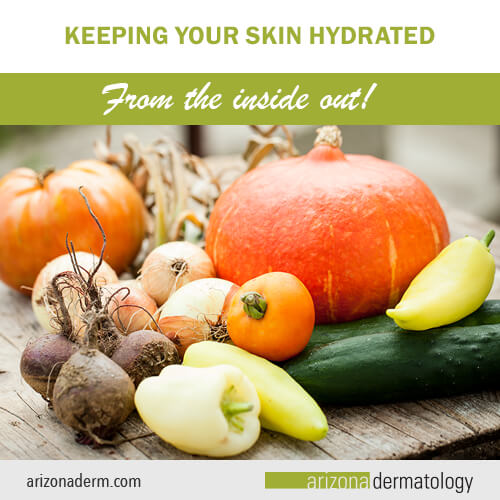 Moisturizing regularly helps keep skin supple and moist, but the most effective way to keep your skin hydrated is to drink adequate amounts of water.
Moisturizing regularly helps keep skin supple and moist, but the most effective way to keep your skin hydrated is to drink adequate amounts of water.
This isn’t always easy to do, however. A busy lifestyle in a culture where there are numerous tempting beverage options probably means you aren’t getting the amount of water your skin needs to look its best.
One way to make up this deficit is to add hydrating foods to your diet. There are a number of healthy food options that are also high in water content. Let’s take a look at a few of the obvious and not-so-obvious options:
Lettuce.
Topping the list at 96% water content is lettuce. A single cup of lettuce provides more than a quarter cup of water, as well as 1 gram of fiber, vitamins K and A,and folate. Most salads contain about 2 cups of lettuce, meaning you are getting an extra half cup or more of water just by having a salad for lunch or adding a salad course to your dinner. You can also increase your intake of lettuce by adding it to sandwiches or replacing the bread altogether with large lettuce leaves, like romaine, to make a tasty and hydrating wrap.
Cucumbers.
Cucumbers have a water content of 95% and are a great way to add extra water to your diet. Cucumbers are also good sources of phytonutrients, which have anti-inflammatory, antioxidant and anti-cancer effects. Up your cucumber intake by adding them to salads and sandwiches, or include them in a stir fry. The cucumber’s cousin, zucchini, is also very hydrating, with a water content of 94%. As it lends itself well to all kinds of savory recipes and can even be used as a replacement for spaghetti noodles, zucchini can be a great way to add more water to your diet.
Watermelon.
Watermelon is aptly named since it is 92% water. A one cup serving contains over half a cup of water, and since it is light and low in calories, you can feel free to eat quite a bit more than that in one sitting, raising your water intake significantly. Watermelon also contains fiber, vitamins A and C, magnesium, and antioxidants like lycopene, which protects the skin from sun and environmental damage. Try this easy 2-ingredient watermelon smoothie: blend 6.5 cups chilled watermelon with the juice of 2 limes in a good blender. Blend in ice if desired. Yields two refreshing and hydrating glasses!
Strawberries.
Not far behind watermelon are strawberries, which boast a water content of 91%. They are also high in fiber and provide vitamin C, folate, manganese and antioxidants like ellagic acid, which helps maintain skin’s elasticity. Adding strawberries to your typical lunch is easy. Dice some up and toss them in a chicken salad. Try a spinach, goat cheese, strawberry and walnut salad. Top a whole grain bagel with light cream cheese and strawberries. Or simply munch a handful with your sandwich for a healthier and more hydrating alternative to chips.
Skim milk.
There are many other fruits that are high in water content (cantaloupe, peaches, and oranges, for example), but skim milk beats them with a water content of 91%, the same as strawberries. With its electrolytes and protein content, skim milk has even been shown to replace body fluid loss after exercise more effectively than sports drinks or plain water. Choosing a breakfast of cereal and skim milk (perhaps with some strawberries on top) is an excellent way to start your day well-hydrated.
Soup.
Broths and soups are typically about 92% water, and they can be a delicious, easy way to increase your overall water consumption. Stay away from creamy soups and instead opt for a broth-based soup (beef or chicken noodle, vegetable, etc.). If your soup is chock full of hydrating vegetables like zucchini, celery, cabbage, or tomato, you’ll be getting a double-whammy of hydration as well as a number of healthy nutrients that will benefit your skin and the rest of your body.
Cottage cheese.
Surprisingly, cottage cheese is relatively high in water content for a food that isn’t a fruit or vegetable– 80%. It also contains large amounts of protein, phosphorus and calcium. In addition, a one cup serving of cottage cheese provides 31% of your daily need for selenium, a skin-friendly mineral that is being closely studied regarding its protective effects against UV damage.


